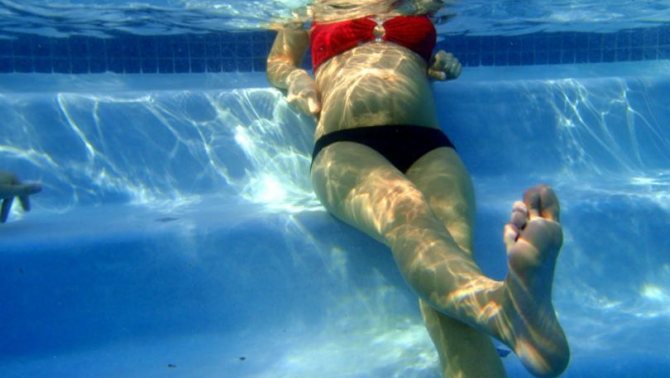Benefit
Swimming as a form of physical activity is beneficial for almost all healthy people, and doubly so for expectant mothers. Water procedures in the pool affect the woman’s body and fetal development as follows:
- when swimming, the muscles of various parts of the body are strengthened;
- the endurance of a woman’s body increases, which is important in preparation for future childbirth;
- blood circulation improves, blood stagnation in the legs and pelvic area is eliminated, and this prevents the appearance of varicose veins and hemorrhoids;
- while in water, the load on the spine is significantly reduced, which helps relieve pain in the lumbar region;
- the respiratory system is trained;
- During swimming, the likelihood that the baby will take the correct position in the stomach (cephalic presentation) increases.
Exercises in the pool for pregnant women (2nd trimester)
You can do pregnancy exercises in the pool if you don't plan to swim. Take precautions: be sure to wear a hat and rubber slippers when you go to the water.
Submerge yourself in water up to about your chest.
Start doing crunches: holding the side, carefully turn the body in different directions.
Then perform squats while standing at the side, facing it and taking a stable position. The emphasis is placed with your feet on the wall of the pool.
Another exercise: lying on your stomach, holding onto the side, pull your knees to your chest as far as you can.
Features of classes during different periods of pregnancy
advice Both doctors and trainers believe that you should start training in the pool as early as possible. The ideal option is to go swimming before pregnancy: in this case, the body will be sufficiently trained.
If the expectant mother decides to sign up for a swimming pool during pregnancy, she should not hesitate, because swimming is useful at any stage of pregnancy.
During the first trimester, you can swim 20 minutes a day, while visiting the pool every other day, i.e. three to four times a week. Subsequently, the duration of classes in the pool can be increased to 45 minutes, but you should focus on your well-being. Swimming should be stopped only when the due date approaches, especially when the mucous plug comes out and abdominal pain appears.
What are the benefits of swimming during pregnancy?
- swimming does not cause body tremors, which occur, for example, when running and jumping, does not put a huge strain on muscles and joints, and the body of a pregnant woman does not overheat during exercise.
- movements in the water allow you to increase metabolism, improve blood circulation and relax muscles, and deep breathing while swimming helps you learn to breathe correctly during childbirth.
- when immersed in water, a woman ceases to feel her body weight, which is especially important during advanced pregnancy. The buoyant force of water reduces the load on the spine and joints, helps reduce the risk of varicose veins and get rid of swelling.
- it takes twice as much effort to counteract the force of the water, with moderate stress on all muscle groups. Exercising in water just once or twice a week is much more effective than daily training in the gym.
- swimming helps a pregnant woman control her weight: during an activity you can burn more than 600 kilocalories in an hour!
- Another important factor is psychological. In the pool, a woman’s body is almost completely hidden under water, so she is relaxed and not burdened with thoughts about her figure, which has temporarily changed for the worse.
Precautionary measures
Any type of physical activity requires compliance with certain safety rules, and swimming is no exception. When exercising in the pool, expectant mothers are advised to pay attention to the following:
- It is better to swim in pools, provided that the staff adheres to sanitary and hygienic water quality standards. Before swimming in open bodies of water, it is necessary to assess the level of cleanliness at least visually, or even better, inquire about the results of the examination at the local sanitation station.
- Significant temperature changes should be avoided when immersed in water.
- You need to swim slowly, preferably in a familiar style. It is better to avoid swimming on your back .
- To visit the pool, you should purchase non-slip rubber shoes to protect yourself from accidental falls on a wet surface.
Swimming is only necessary if you feel well. If you experience any discomfort or unpleasant sensations during exercise, you should get out of the water.
What are the benefits of a swimming pool for pregnant women?
Swimming is not only one of the most gentle forms of physical activity, but also a real pleasure. Distance work and water aerobics increase tone, give a feeling of a surge of strength and at the same time have a minimum number of contraindications, which is especially important for pregnant women in the pool. From the moment of immersion and throughout the entire session, the body is supported by water, due to which the loads are distributed evenly. Thanks to this, both general overstrain and negative effects on a specific muscle group or joint are eliminated. The benefits of swimming for pregnant women make visiting the pool one of the best options for physical activity. Thanks to him:
- the muscle corset and the body as a whole are strengthened - during training, the “working” muscles alternate, each group receives moderate loads, as a result, overall endurance and tone increase;
- swimming movements are measured and slow, when performed, the muscles stretch and become more elastic and strong, without increasing in volume;
- water reduces static tension in the spine, therefore posture improves, pain and tension in the lower back and shoulder girdle go away;
- when swimming, a person moves without support, due to which the muscles of the foot and ankle ligaments are strengthened;
- swimming requires synchronous work of muscles and breathing, due to which the work of the circulatory, cardiovascular and nervous systems is strengthened, the respiratory muscles are strengthened, the vital capacity of the lungs becomes larger - all this will help to behave correctly during the birth process;
- when swimming, the lungs receive an increased amount of oxygen, which saturates the blood and all tissues of the body;
- swimming during pregnancy has a beneficial effect on the body's protective functions: thermoregulation is improved, the immune system is strengthened, and the body's adaptive abilities are increased;
- Water during training has a kind of massage effect that relieves muscle and nervous tension, helps to cope with stress and relax.
The benefits of swimming
The benefits of swimming in the pool for pregnant women are difficult to overestimate. This is one of the few load options that combines safety and effectiveness, allowing you to get excellent physical and psycho-emotional results in a short time and without training.
Contraindications
Visiting the pool is contraindicated for expectant mothers in the following cases:
- if there is a threat of termination of pregnancy - in case of a high probability of miscarriage or premature birth;
- if placenta previa is detected;
- in the presence of vaginal discharge resulting from any infection or imbalance of microflora;
- in case of allergy to chlorine-containing compounds, which are used to disinfect water in swimming pools.
important Before starting classes, you should definitely inform the doctor monitoring your pregnancy about your intention, since a woman may not independently recognize the symptoms in which swimming may be contraindicated.
Contraindications: when is a swimming pool undesirable during pregnancy?
Swimming during pregnancy is useful and universal for women of all ages and with different physical shapes, including those with excess body weight. Nevertheless, any physical activity has contraindications and limitations - both general and individual. To find out whether a pregnant woman can go to the pool, she first needs to visit a gynecologist and therapist. The first will assess the presence of contraindications from the reproductive system, the second will help assess whether such a load is suitable for a particular organism and health condition. So, contraindications for visiting the pool during pregnancy include:
- threat of miscarriage - the presence of a large retrochorial hematoma, increased tone and other risk factors for miscarriage or premature birth;
- placenta previa - with low placentation and intense exercise, bleeding may occur;
- vaginal discharge - acute infections of the lower genital tract require treatment and rest;
- any “alarming” symptoms - spotting, pain in the lower abdomen, dizziness - require immediate medical attention and are an absolute contraindication for swimming in the pool during pregnancy;
- nausea and toxicosis - vomiting interferes with normal breathing during exercise, and general weakness due to problems with appetite generally worsens well-being, which is also undesirable for exercise in the pool;
- deterioration in well-being after training - it can be associated with both incorrect swimming technique and problems with the respiratory or cardiovascular system. In any case, if you experience a headache or other unpleasant symptoms during swimming or immediately after it, you should consult a doctor for advice and stop exercising until the circumstances are clarified.

Contraindications for swimming in the pool during pregnancy
It is not advisable to swim if you have problems with appendicitis, the presence of systemic blood diseases, manifestations of gestosis, or spasmodic pain during or after training. Swimming in the pool in the first trimester of pregnancy should be done with extreme caution and only in consultation with a gynecologist. The period from 1 to 14 weeks is the most “difficult”: the embryo is implanted and begins to develop, all its organs and body systems are formed, but there is no placenta to protect the fetus from external influences. All these indirect factors can be a threat to pregnancy, so the most favorable time to start training is the second trimester.
It is worth considering that there are restrictions on visiting the pools that apply not only to pregnant women, but to all guests. These include purulent lesions of soft tissues and skin, tuberculosis, fungal infections, helminthiasis, lichen and epilepsy.
When can I start?
Pregnancy is not a pathology, and there is no need to give up your usual lifestyle, just be careful.
If you feel normal, you can go to the pool from the very beginning of pregnancy, but it is recommended to listen to your body and not exercise forcefully or if you feel unwell.
The main thing is to take reasonable precautions: avoid sudden changes in temperature, heavy loads and intense training, do not overexert yourself, and do not demand too much from your body.
The benefits of swimming during pregnancy
It's definitely useful. There are reasonable explanations for this:
- swimming relaxes the muscles, relieves stress from the spine and lumbar region, which suffer the most during pregnancy;
- while in the water, a kind of body massage occurs, which is very useful in this position;
- Regular swimming in the pool relieves swelling;
- it has been noticed that mothers who visit the pool have no difficulties with subsequent lactation, since blood flow to the chest during swimming is always ensured in full;
- diving is useful. Holding the mother's breath accustoms the fetus to the absence of oxygen for some time, this is very useful during childbirth.
INTERESTING! Japanese doctors have long determined that pearl divers who regularly hold their breath in the water for long periods of time have babies who endure the birthing process much more easily.
And finally, the swimming procedure itself is relaxing and calming. And women during pregnancy are often irritable.
How long can you swim?
Doctors willingly allow swimming both in the first month and in the later stages of fetal development, provided that the mother is healthy and in general well-being.
It is also recommended to start training in advance, even at the stage of pregnancy planning - the sooner your muscles and immunity are strengthened, the fewer problems will arise when carrying a child.
But when deciding to start training, you should take into account the characteristics of different periods. In the first trimester
the fertilized egg attaches to the walls of the uterus, so active sports swimming and high loads are not recommended. Exercises in the early stages can also be complicated by poor health and frequent toxicosis.
Second trimester
- the most favorable time for swimming training. Morning sickness usually subsides completely, the weight of the fetus is still small, and movements are not difficult. During this period, doctors recommend regular training and water aerobics classes in special groups for pregnant women.
In the third trimester
it is usually already difficult for a woman to move freely, and physical activity must be limited so as not to provoke premature birth. During this period, it is better to give up sports activities and swim at a relaxed, calm pace for 20-30 minutes. It is important to pay special attention to breathing training.

Swimming at 9 months is not always permitted. These days, the protective mucus plug that covers the cervical cavity often comes off. This can happen two to three weeks before birth, and the risk of infection while in the water becomes very high. During this period, a woman is allowed to wash only in the shower, and she has to forget about taking a bath, swimming in open water or swimming in a pool.











